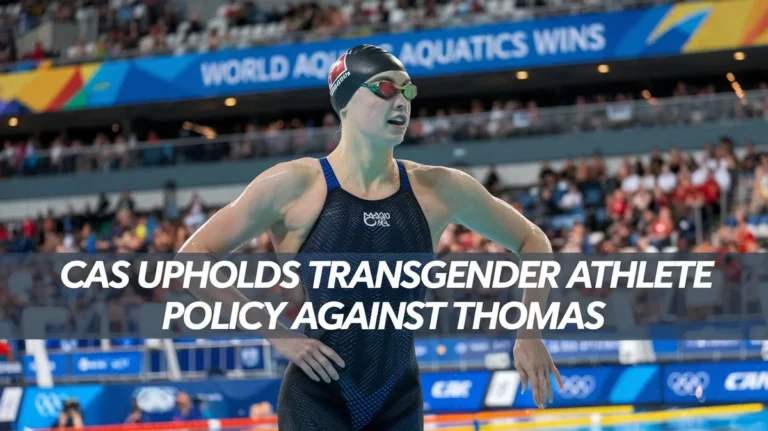Lia Thomas, the transgender swimmer who made headlines after winning an NCAA championship in 2022, has faced a significant setback in her legal battle against World Aquatics (WA).
The Court of Arbitration for Sport (CAS) recently dismissed her challenge to WA’s rules, which restrict transgender athletes from competing in elite women’s races.
This decision not only prevents Thomas from participating in the upcoming Paris Olympics but also reignites the ongoing debate about the inclusion of transgender athletes in elite sports.
Major news outlets like CBS News, BBC, and Sky Sports have extensively covered the story, highlighting its far-reaching implications.
The CAS Decision and World Aquatics’ Policy
The CAS ruling upheld WA’s policy, which bars transgender women who have undergone male puberty from competing in women’s races.
This policy, introduced in 2022, also established an “open” category for transgender athletes.
Thomas argued that the policy was invalid, unlawful, and discriminatory, but the court found that she lacked the standing to challenge it.
The panel noted that Thomas is not currently a member of USA Swimming and does not compete in World Aquatics events, which limited her ability to contest the rules.
WA welcomed the decision, calling it a “major step forward in our efforts to protect women’s sport.”
The organization reiterated its commitment to fostering fairness, respect, and equal opportunities for athletes of all genders, while maintaining the integrity of women’s competitions.
Also Read: Game Changer: Ty Haywood Chooses Michigan, Elevating Wolverines’ Offensive Line Dreams
Thomas’s Response and Support
Thomas expressed deep disappointment with the ruling, calling it a blow to transgender athletes everywhere.
She argued that blanket bans on trans women in sports are discriminatory and strip away opportunities that are central to their identities.
“The decision should be seen as a call to action to all trans women athletes to continue to fight for our dignity and human rights,” Thomas said.
Her stance has garnered support from advocacy groups like Athlete Ally, an LGBTQ rights organization.
Hudson Taylor, the group’s founder, criticized the ruling, stating that it denied Thomas her fundamental right to seek redress for what she sees as a violation of her human rights.
“This is a sad day for sports and for anyone who believes that trans athletes should have the opportunity for their experiences of discrimination to be heard and adjudicated like everyone else,” Taylor said.
Reactions and Broader Debate
The decision has sparked a wide range of reactions, reflecting the polarizing nature of the issue.
Martina Navratilova, a tennis legend, has voiced concerns about the fairness of transgender women competing against cisgender women, while Caitlyn Jenner, an Olympic gold medalist, has emphasized the need to protect women’s sports.
On the other hand, Schuyler Bailar, the first transgender athlete to compete on a NCAA Division 1 men’s team, has stood by Thomas.
He criticized the narrative that trans women pose a threat to women’s sports, arguing that the controversy often stems from societal attempts to police and define womanhood.
Implications for Transgender Athletes
The CAS decision and WA’s policy have broader implications for transgender athletes in elite sports.
For now, Thomas is ineligible to compete in World Aquatics or USA Swimming events, a ruling that underscores the challenges transgender athletes face in navigating the complex landscape of competitive sports.
WA has defended its approach, stating that the open category offers a fair solution for gender inclusion while maintaining the integrity of women’s competitions.
This ruling is likely to fuel further debate about how sports organizations can balance inclusivity with fairness, leaving many to wonder what the future holds for transgender athletes on the global stage.
As the conversation continues, one thing is clear: the fight for equality and representation in sports is far from over.
